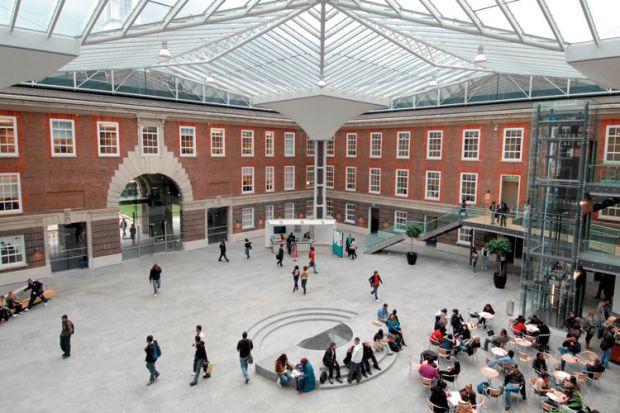It’s a grey, murky afternoon in northwest London, but Middlesex University’s main quad is still teeming with students.
Undergraduates sip Starbucks coffees, check their iPads and chat leisurely with friends unperturbed by the autumn chill affecting the rest of Hendon, thanks to a vast glass roof overhead.
This stunning piece of architecture, completed in 2006 at a cost of £13 million, is the most visible part of the legacy left by Michael Driscoll, who retired this summer after almost 20 years as vice-chancellor.
Driscoll took the helm in 1996 – four years after Middlesex Polytechnic gained university status – and proceeded to transform the institution with a number of ambitious projects at home and overseas.
During his tenure, a multitude of teaching sites dotted across north London were closed and sold, with about £200 million invested in the university’s impressive modernist campus in Hendon since 2000.
Middlesex was also one of the first UK universities to set up an international branch campus, in 2004, and it now has about 2,000 students located in Dubai in addition to smaller outfits in Mauritius and Malta.
So how does Tim Blackman, the new vice-chancellor, put his imprint on a university at the end of two decades of radical change?
“Michael has created some very good foundations for me,” admits Blackman, who was pro vice-chancellor for research at The Open University for four years and also acting vice-chancellor.
But there is scope to expand some of the activities in which Middlesex has excelled, Blackman believes.
“Middlesex has a terrific reputation for its partnerships with business, and a real strength is work-placed learning,” he explains.
“Many universities have pulled out of collaborative provision because they see it as a risk, but it is something we do really well,” he adds, citing the Asda-backed course in retail operations as a market leader.
The institution has had strong links to business since its earliest days, long before the idea of “industry engagement” became fashionable in higher education, Blackman says.
One of its predecessors – the Ediswan Institute, which later became Enfield College of Technology – was founded by Joseph Wilson Swan, the British inventor behind the first electric light bulbs, he says.
Community engagement by universities – another focus for Blackman – also has strong roots at Middlesex, he contends.
It was his experience at Enfield that Eric Robinson drew on in penning his influential 1968 book The New Polytechnics: The People’s Universities, cited as a major factor in the creation of the new universities that gained formal recognition after 1992.
“Robinson wanted study to have a real purpose, [with institutions] producing the best technology and being heavily involved in their communities,” Blackman says.
Middlesex’s highly diverse student population – about half are from ethnic minorities and 20 per cent from abroad – is testament to the university’s work in its locale, he says.
This diversity can be harnessed to improve classroom experience via more peer-to-peer learning, Blackman believes. “We have the best graduates coming back to teach, while second and third years who are doing well mentor first-year students, so I’d like to see how we can use this [more]…as it is very effective.”
The vice-chancellor is also keen on more student input into the curriculum – yet another development pioneered at Middlesex, he says.
“The sit-ins at Hornsey College of Art – one of our institutions – in 1968 were started by students who really just wanted to influence their curriculum. It started a massive wave of sit-ins and a whole movement across the country, but student engagement is something we take for granted now.”
It seems, for Blackman, that Middlesex’s illustrious past is as good a place as any to look for inspiration as he seeks to shape its future.
In numbers
20% of Middlesex University’s students come from overseas
Campus news
UCL Institute of Education
A professor of cognitive science has won a £100,000 award for her research on autistic children. Liz Pellicano, professor of autism education at UCL Institute of Education, picked up one of the Philip Leverhulme prizes, which recognises outstanding researchers who have “attracted international recognition and whose future career is exceptionally promising”. Professor Pellicano, the director of the Centre for Research in Autism and Education, was honoured for her work on the challenges faced by children and young adults with autism.
The Open University
The Open University has rejoined the University Alliance, two and a half years after leaving the mission group. Peter Horrocks, the OU’s vice-chancellor, said that joining the organisation would allow institutions to work together on challenges such as the collapse in the number of part-time students, and also to “build on our shared commitment to quality, innovation and inclusivity”. Mr Horrocks’ predecessor, Martin Bean, ended the OU’s previous six and a half year association with the alliance in July 2013. The mission group now has 19 members.
University of Kent
An academic has advocated the use of psychoactive drugs to encourage sedentary people to exercise. Alongside a lack of time, one of the principal barriers to exercise is the effort that physical exertion is perceived to require. Samuele Marcora, director of research at the University of Kent’s School of Sport and Exercise Sciences, suggests that the use of caffeine or psychoactive drugs such as methylphenidate and modafinil could help many people stick to their fitness plans. Professor Marcora makes the claim in a paper published in the journal Sports Medicine.
University of the West of Scotland
A new Centre for African Research on Enterprise and Economic Development has been opened at the University of the West of Scotland. It will carry out research on topics including commodities and exporting; entrepreneurship; logistics and supply chain management; governance and ethics; and microfinance and social business. Executive training for African government and civic leaders will also be provided at the Paisley-based centre, which was launched with a conference on 12 and 13 November.
Queen Margaret University
A new potato that has recently been introduced to the UK market will provide a major boost for the Scottish economy, research has found. According to academics from Queen Margaret University (QMU), the Gemson potato, a small salad variety, has a positive impact on the environment because it produces less waste and can offer higher yields for the farmer in comparison with its main competitor, Maris Peer. The Gemson, a relatively new variety, was developed by the James Hutton Institute in Dundee and introduced to the market by Grampian Growers.
University Campus Suffolk
University Campus Suffolk (UCS) has been granted the power to award its own undergraduate and taught postgraduate degrees, a move that edges it closer to becoming an independent university. Until now, its degrees have been jointly validated by the University of East Anglia and the University of Essex. The taught degree-awarding powers, granted by the Privy Council with immediate effect, mean that the institution will be able to apply for university title.
Manchester Metropolitan University
Academics have collaborated with an independent publisher to create a literature app that allows readers to filter stories, poetry and non-fiction from new writers to match their literary tastes and the length of their journeys to work. Manchester Metropolitan University’s School of Computing, Mathematics and Digital Technology linked with Comma Press to create the MacGuffin app, a self-publishing platform that also allows users to upload their own work along with an audio reading.
Aston University
The relationship between the UK’s automotive industry and the European Union was top of the agenda at a university-hosted event. “Staying in the Fast Lane: Britain’s Auto Industry in Europe” was held at Aston University’s Aston Centre for Europe and featured academics, professionals and trade body representatives discussing concerns that rival automotive industries in Germany, France and Italy could benefit from a Brexit – along with arguments that the UK’s industry could thrive if the nation left the EU.
后记
Print headline: Future direction of travel builds on pioneering past




